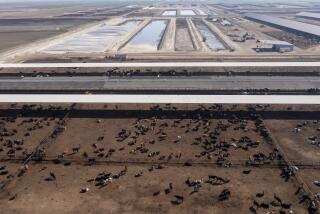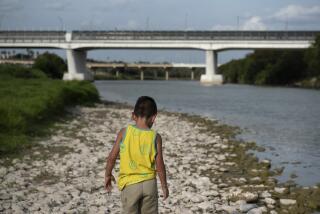Modest Projects, Not Grand Schemes, Help to Revitalize Small Texas Town : Rural Economy: The Fisher County Economic Development Commission made one key decision: Go for all the little projects, not one big project. The result has become a creative model for rural economic development.
- Share via
ROBY, Tex. — Worn by long hours and weary of watching the town shrink, Bill Brzezinski threw in the towel on his Silver Spur Cafe 18 months ago, selling off the only restaurant in this dusty west Texas hamlet.
Like the hardware store, the gas station, the grocery and so many others in so many towns in so many parts of rural America, the Silver Spur soon failed, and Brzezinski figured Roby wasn’t far behind.
But today, an unusual economic development plan has begun to breathe new life into this one-stoplight town. A new retirement center has opened, and because of aggressive promotion, coveys of quail hunters now flock to Fisher County.
Even the Silver Spur is going to shine again. Brzezinski is renovating the cafe and bringing it back from the dead this fall, convinced that the hungry hunters who come from 26 states for the four-month season will help the town of 814, and its only restaurant, survive.
“Our attitude has changed,” he said. “This is what has inspired me to do it again.”
What’s happening in Fisher County is held up across remote areas as an innovative approach to saving dying towns. But even here, after a handful of small successes, the future remains mostly bleak, and experts say the situation underscores just how difficult it is to revitalize rural America.
“We have slowed the departure rate but, honestly, we haven’t stopped it or reversed it,” said David Morris, chairman of the county’s economic development commission. “All this is for naught unless we find the key to repopulating rural America.”
Three years ago, Fisher County’s leaders declared a crisis: If they didn’t do something, the county would die. Typical of small rural towns across the country, the population had already declined 44% over 10 years to just 5,000. Storefronts were boarded up. People, especially the young, moved to the cities.
“We were kind of desperate--no doubt about it,” said Richard Spencer, the county agriculture extension agent who brought together the local leaders.
They rounded up state and national experts on economic development and sought their advice.
They created the Fisher County Economic Development Commission, and they made one key decision: Go for all the little projects they could think of, not one big project.
“Everyone thinks that General Motors is going to come drop a factory in here or the B-2 program will drop in here. That doesn’t happen, and that’s the common mistake rural people make,” said Morris, a specialist on developing Third World nations who retired to run a motel here.
The result has become a creative, if unconventional, model for rural economic development.
“They have less money and resources to work with, and yet after 10 years of decline, now they’ve got new money coming in,” said David Guarino of the Texas Department of Agriculture, which has provided a grant for the quail-hunting effort. “If they can do it, you can do it all over.”
The commission has set out to revive this depressed cattle, cotton and oil area by promoting it as a retirement spot, drawing tourists and finding ways to keep citizens from leaving.
Two commission members bought an abandoned nursing home and helped find new owners who have refurbished it. It’s now the county’s only retirement center--even though 60% of the population is over age 55.
Realizing Fisher County had Texas’ largest quail population, the commission formed a quail-hunting cooperative, which in its first year brought in 140 hunters and an estimated $100,000 of new spending.
“One hundred thousand dollars is an attention-getter in this town,” said Billy Don Atkinson, a Roby-based federal agriculture official who helps run the co-op.
And in Fisher County, they will try anything.
The commission is hoping to build a memorial garden for slain police officers and turn an abandoned electric train depot into a museum to draw tourists. They are trying to raise money and serve the large poverty-level population with a food bank and used-clothing store. They have helped open a recreational vehicle park.
The group even formed the National Domino Assn. and played host to a first-ever national tournament.
Not all of the ideas are working.
The domino idea, while fun, hasn’t produced much money and will probably be cut back. The law enforcement monument has drawn a 15-acre land donation, but has only $400 in the bank.
“Time is short; doom is just around the corner,” said the Rev. Alvin Petty, the leader of the commission’s tourism task force. “We’ve only got three or four more years to achieve a great deal because we’re losing 8% of our population a year.”
Commission officials say they now know that their small-scale endeavors are simply setting the stage for necessary larger development. “We have prepared the table, but we haven’t gotten to the meat and potatoes,” Morris said.
And help will have to come from Washington, he believes, in the form of a modern Homestead Act that would once again encourage people to return to rural areas.
“Until we get that kind of public policy, the rest of this is Mickey Mouse. If they don’t put that structure in place, all of rural America will be blowing in the wind.”
More to Read
Sign up for Essential California
The most important California stories and recommendations in your inbox every morning.
You may occasionally receive promotional content from the Los Angeles Times.













